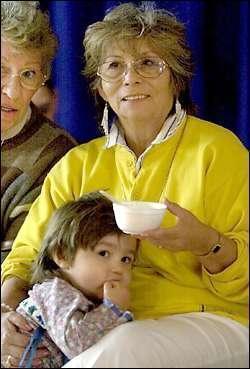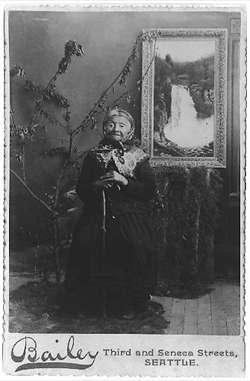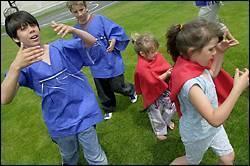 |
| KEVIN GERMAN / THE SEATTLE TIMES |
| Cecile Hansen, chairwoman of the Duwamish tribe, cuddles her grandson Benny Johnson, 2, and sits by friend Lois Wickstrom during an annual tribal meeting. |
Theirs was the land the white people wanted most.
To the Duwamish, the indigenous people of what is now Seattle and King County, this place was an ideal site for winter longhouses and summer camps, salmon weirs and canoe landings. To the newcomers, the place lent itself to a new town, with gridded streets, a mill, deep-water anchorage and, eventually, steel mills and boat docks, concrete plants and sports stadiums.
The newcomers' vision won, and the Duwamish were dispersed. For them, there would be no reservation, no fishing rights, no visible landmark of their legacy.
"But ... many of our people never left," says Cecile Hansen, the Duwamish tribal chairwoman.
One hundred and fifty years after the Denny Party arrived and started the settlement that would become Seattle, Hansen and other Duwamish have no desire to turn back the clock. But they do seek federal recognition as a distinct tribe and want a place where their people can gather in the city that bears their chief's name. Hansen is the great-great-grandniece of Chief Seattle, and her grandmother is buried next to him on the Suquamish reservation.
The Duwamish want to deal with the United States on a government-to-government basis and want to offer their members services such as education and health care - rights guaranteed in the treaty they signed.
In the 1855 Treaty of Point Elliott, 81 Indian leaders representing 15 tribes ceded Puget Sound to the United States. Chief Seattle was the first to make his mark on behalf of the Suquamish and Duwamish. The Suquamish got their own reservation; the Duwamish didn't.
 |
| MUSEUM OF HISTORY AND INDUSTRY |
| Chief Seattle's daughter, Kickisomlo, who was dubbed Princess Angeline by the white settlers, was born sometime around 1820. She died in 1896. In this 1890 photo, she's seated by a photo of Snoqualmie Falls. |
The Duwamish were supposed to move to the Suquamish, Tulalip, Muckleshoot or Lummi reservations and live among other tribes. Many did, but others never left or soon returned to their homeland, dismayed by the restrictions of reservation life.
Without a land base, the 570 or so registered Duwamish members struggle against invisibility. Their numbers are small, their blood mixed. Without recognition, "the prospects of the tribe existing and surviving are extremely limited," said James Rasmussen, a third-generation Duwamish council member. "We followed through on our end of the agreement, and we're waiting for the federal government to follow through on theirs."
Federal recognition, he says, will fulfill the treaty that guaranteed signatories a government-to-government relationship with the United States. And it will ensure the Duwamish "more than a place at the table" when decisions are made about environmental and other issues, said Rasmussen, whose great-great-great-grandmother was a Duwamish elite and niece of one of Puget Sound's last medicine men.
A brief recognition
The Duwamish thought they were close to establishing such a relationship when, on Jan. 19, just before 9 p.m., Washington, D.C., time, tribal chairwoman Hansen got a phone call from Lee Fleming, head of the Bureau of Indian Affairs' Bureau of Acknowledgement and Research.
With three hours left in the Clinton administration, Fleming told Hansen the federal government was recognizing the Duwamish tribe.
But less than 48 hours later, Hansen learned President Bush suspended a batch of his predecessor's 11th-hour orders, including federal recognition of the Duwamish.
"Now we're 'pending.' We're in this terrible limbo," Hansen said.
The Duwamish had the misfortune of living on some of the most sought-after real estate in the region, says historian David Buerge. Their longhouses were torched, and they were banned from owning land that had been theirs for generations.
The Duwamish ceded 54,700 acres of land, but it took almost 120 years and a long court battle for the United States to pay up: In 1971, about 1,000 people were each paid $64.
"I bought groceries," said Hansen. "What else can you do with $64?"
The Duwamish and other landless people were dropped from the list of federally recognized tribes sometime in the 1960s, Hansen said. Though Judge George Boldt ruled in 1974 that tribes who signed the Point Elliott Treaty had rights to half of the area's fish, he later ruled the Duwamish and four other groups weren't political entities and so weren't entitled to treaty rights.
Tribe takes priority
Hansen's story is much like the story of her tribe, a people who have adapted to survive while holding tight to their Duwamish identity.
She's brusque, tough and funny. She's a Catholic and volunteers at her church. She has borne eight children and buried three. She loves Neil Diamond, boats and her rose bushes.
She's a private woman who has tried to resign many times in her 26 years of leadership. The last was in 1996, when the BIA rejected Duwamish recognition.
Hansen called the council together and they split up the tribe's roster, phoning every Duwamish to find out what to do next.
"They overwhelmingly said, `We want to keep fighting,' " Hansen said. "That gave me the motivation to go on.
"The tribe always takes priority to everything else," she continued. "As many times as I've tried to get away from this work, I think this is the Lord's plan for me because I was just minding my own business, trying to raise my kids."
She was elected tribal chairwoman in 1975. It's a lifetime position and, until this year, an unpaid one. Hansen was a young mother when the tribe began fighting for recognition in 1978. Now, she's a great-grandmother.
Hansen works out of the tribe's office, most recently a rented Burien storefront next to a hair salon, less than two miles from the house where she lived as a Highline High School student in the 1950s.
Her dad was a longshoreman, fisherman and woodsman who knew how to fix cars. Her mom was raised in Indian boarding schools from age 4 to 17, worked in canneries and raised five children. At age 50, she went to college and became a nurse.
In the early 1970s, Hansen's late brother Manny was arrested several times for fishing in the Duwamish River, and that was the beginning of Hansen's research into her people's past. Around the same time, she met Buerge, a teacher and local historian who is writing a biography of Chief Seattle. Hansen credits him with piecing together much of what's known about Duwamish history. But there were many people along the way - historians, anthropologists, linguists and others - who helped compile necessary evidence for the tribe's application for federal recognition.
 |
| KEVIN GERMAN / THE SEATTLE TIMES |
| Ashley Broadway-Shelafoe, 8, right, and her sister Cheyenne, 3, dance with Jared Broadway, 12, left, and Michael Butler, 11, as they perform the Challenge Dance Song at an annual meeting of the Duwamish tribe. |
Should the Bush administration approve Duwamish recognition, the decision inevitably will be appealed, likely by tribes already recognized.
According to Rasmussen, the Muckleshoot have already indicated they would appeal. The Muckleshoot didn't return phone calls requesting comment.
Herman Williams Jr., chairman of the board of directors for the Tulalip Tribes, said it was unlikely the Tulalips would appeal, having lost other recognition cases. The Tulalips argue that the Puget Sound Indians who moved to reservations are the ones who kept their end of the treaty bargain.
"We ceded our land and moved to reservations, went through the hardships, sifted bugs out of our flour and endured the diseases. We were Indian when it wasn't popular to be Indian, while other people got to assimilate into the community," said Williams.
Hansen knows if and when recognition comes through, there will be more red tape. The tribe will need to write a constitution, determine membership criteria and establish ordinances.
The tribe's top priority now is getting a longhouse built on West Marginal Way, across the street from the city's new Herring House Park, site of an old Duwamish village and a 360-foot potlatch house.
A couple of years ago, an anonymous group of West Seattleites gave $52,000 so the tribe could put a down payment on a small parcel of land downstream from Terminal 107 and Kellogg Island.
So far, the tribe has secured two $60,000 grants from King County and $5,000 from Seattle's Department of Neighborhoods for design work and mortgage payments. Hansen estimates the tribe needs to raise $2 million more.
"We need to be able to bring our people back together again, to educate our children in their culture, to welcome other tribes to the area, and most importantly, to be able to tell a story to the people who live here, to give them a sense of place and history," Rasmussen said.
Sara Jean Green can be reached at 206-515-5654 or at sgreen@seattletimes.com.
|
 Monday, June 18, 2001 - 12:00 a.m. Pacific
Monday, June 18, 2001 - 12:00 a.m. Pacific

